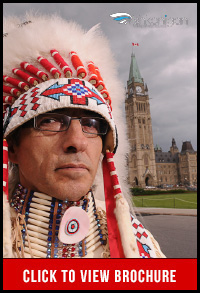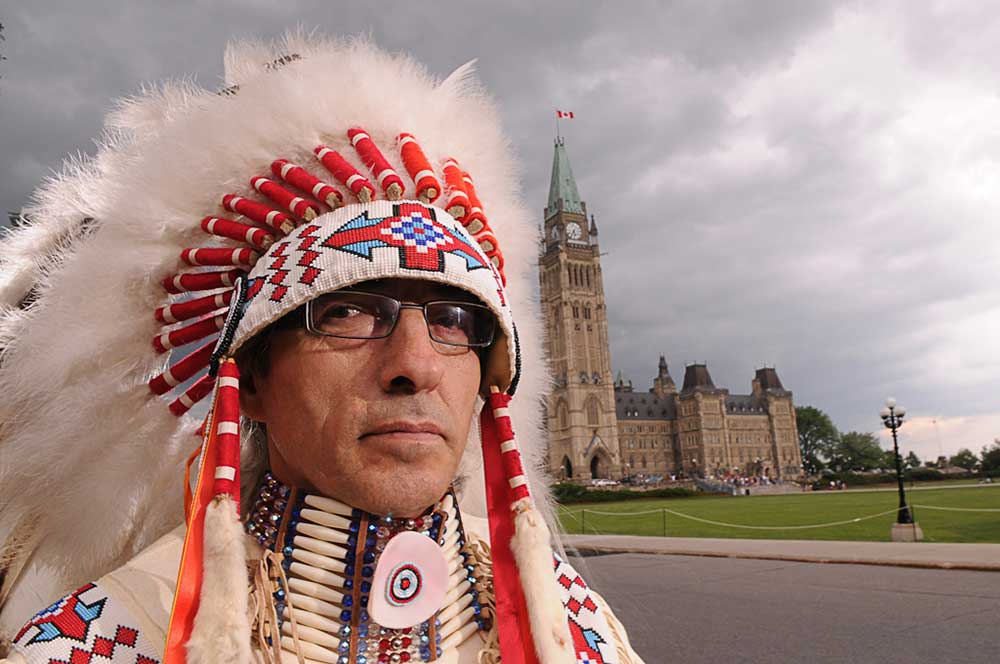Capacity Development. Relationship Building. Reconciliation.
By Anna Guy
“There is a clear recognition out of the corporate business community that the old way of doing business with Aboriginal companies is gone, and the new way means fundamental changes for full engagement and participation with the Aboriginal community.”—Phil Fontaine, Ishkonigan.
 Canada’s top indigenous consulting firm
Canada’s top indigenous consulting firm
Currently, there is approximately $650 billion of investment and hundreds of major resource projects in Canada on Indigenous land—ensuring the development of these projects takes an equal understanding of corporate law, government, and the Indigenous culture tied to the land. As Canada’s foremost indigenous consulting firm, Ishkonigan’s specialty in consultation, negotiation and mediation services for indigenous communities, all levels of government, and corporations has led to numerous successful partnerships and follow-through on such projects.
Based out of Akwesasne Mohawk Territory, near Cornwall, ON, Ishkonigan was founded in 2009 by Phil Fontaine. Uniquely qualified to represent Aboriginal communities, Fontaine served as National Chief of the Assembly of First Nations for an unprecedented three terms, and has a record of advocating on behalf of Indigenous people in Canada that goes back to when he was elected Chief of his community at 28 years old.
Ishkonigan’s team is made of leading experts in the fields of consultation, negotiations law, government, politics and business, as well as a sound familiarity with prevailing industry practices, and government relations. In a landscape of unprecedented opportunity, Ishkonigan provides mediation services to support strong, mutually-beneficial partnerships between Indigenous communities, corporate Canada and governments. Ishkonigan has successfully negotiated Aboriginal Engagement projects in Saskatchewan, Manitoba, Eastern Ontario, Quebec, New Brunswick, and Nova Scotia.
“Ishkonigan’s goal has always been to strengthen our First Nation’s position in resource development by working with Corporate Canada to better engage and support Aboriginal involvement,” says Fontaine.
A New Way
Historically, the community involvement of corporate companies was largely unplanned or mismanaged. To a large extent, interaction between a company operating on Indigenous land and the community who lived there was considered secondary to the operation. Over the last several years however, there has been a shift in thinking—and practise—about corporate and Aboriginal working partnerships. Understanding treaty rights, Aboriginal rights, the inclusion and participation of Aboriginal stakeholders, have become critical components of any successful operation between Indigenous groups and the private sector.
Ishkonigan has guided several of the country’s largest corporations and financial institutions navigate these areas successfully, establishing long-term relationships. “Joint Ventures, partnerships, and respect for culture and rights, are the foundation of very positive working relations between Aboriginal communities and corporate business,” says Fontaine.
“There is clear recognition from the business community that the old way of doing business is out, and there is a new way to for meaningful, full engagement and participation of the Aboriginal community in the way the development will occur,” says Fontaine. “And this reflects an attitudinal shift on the side of the Aboriginal community as well. The language of joint venture, ownership, equity, is not longer about just jobs and training.”
An example of a successful working partnership in action, Fontaine points to the Moose Cree First Nation and Ontario Power Generation—the largest First Nation-utility partnership of its kind. A long play on sustainable energy infrastructure in Canada’s North, the Lower Mattagami River Hydroelectric Complex is a $2.6-billion project that was formed after consultations with First Nations on whose traditional lands the project would impact. Moose Cree Nation owns a 25 per cent stake in the project, a significant equity position.
The project is the embodiment of evolution of these kinds of agreements. Fifty years ago, the dam was built on Moose Cree lands and treaty rights were ignored. When the OPG started to open dialogues, they were deemed not to be mutually beneficial by the Moose Cree. It was finally in 2005, after extensive consultation—a central part of which included reconciliation—a deal was struck that not only meet legal obligations, but that ensured the First Nation was heard and their concerns responded to.
“Although my company was not involved in the Moose Cree-OPG project, I believe it stands as a good model for both First Nations and industry to look at and learn from. Today, it’s a losing proposition for industry to take any other approach,” says Fontaine. “We have seen over and over, it is far better for both parties to have a community that has the capacity to engage in a meaningful way.”
Fontaine advises corporations to educate themselves on the culture with which they want to engage. “Just as you would doing business in another country like China or India, you need to understand certain protocols and etiquette.”
Working out future business and financial arrangements with the corporate sector can make an positive impact in eradicating poverty, according to Fontaine. “That is a huge challenge because to begin to move out of poverty and dependency, you must be active and engaged partners in development. This represents a steep learning curve for Aboriginal communities and industry because trust must be developed.”
Indigenous Roots
Fontaine has always been a trail-blazer, and is leading the way in his newest business venture, Indigenous Roots, a joint venture medical cannabis company in partnership with The Cronos Group. This business, the first licensed majority Indigenous owned medical cannabis producer, is being led by Mr. Fontaine. It is focused on Indigenous ownership and operation, providing jobs to First Nations, and addressing under-served citizen’s patient needs.
Through the Indigenous Roots partnership, Cronos will provide land for the initial 30,000 square foot flagship facility (Spring 2017), license, intellectual property and engineering expertise. This unique business model is a platform for opportunity through expansion permits with existing licensed producers, providing an expedited path for investment, operation and participation in the medical cannabis field.
Indigenous Roots mission is to provide First Nation people with safe, accessible, high quality medicinal cannabis—by First Nation people, for First Nation people in the process of remaining true to Indigenous values and beliefs. The business also envisions creating a nationally and globally recognized brand of medical cannabis, owned and operated by First Nations.
Legislative Process
Ishkonigan also guides its Aboriginal clients through its accumulated decades of experience working in the federal and provincial legislative processes. “Our experience in assisting government in drafting laws and regulations comes into play when
communicating these processes to our partners,” says Fontaine. Ishkonigan’s familiarity with how the Federal political and bureaucratic decision making processes work has led Indigenous communities to greater participation in these processes, again establishing very successful working relationships.
“These projects, which are usually in the resource sector and take place on Indigenous land, when put together in a way that benefits all parties, can mean a new future for these communities which otherwise would have very few prospects. This has helped to change the path for future generations in this country, and we are proud to be a part of that.”
For more information or to contact Ishkonigan, please visit www.ishkonigan.com






